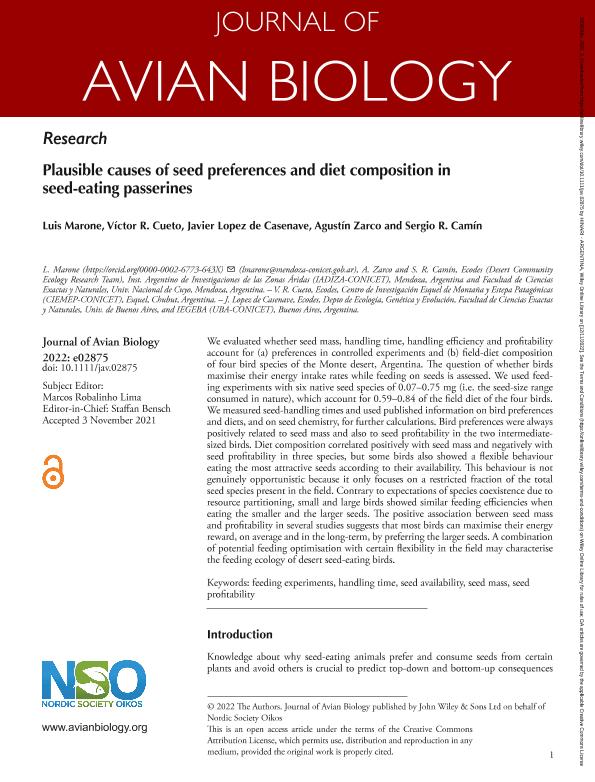Mostrar el registro sencillo del ítem
dc.contributor.author
Marone, Luis

dc.contributor.author
Cueto, Víctor

dc.contributor.author
Lopez de Casenave, Javier Nestor

dc.contributor.author
Zarco, Agustín

dc.contributor.author
Camín, Sergio Ramón

dc.date.available
2023-08-14T19:22:02Z
dc.date.issued
2022-01
dc.identifier.citation
Marone, Luis; Cueto, Víctor; Lopez de Casenave, Javier Nestor; Zarco, Agustín; Camín, Sergio Ramón; Plausible causes of seed preferences and diet composition in seed-eating passerines; Wiley Blackwell Publishing, Inc; Journal Of Avian Biology; 3; 1-2022; 1-10
dc.identifier.issn
0908-8857
dc.identifier.uri
http://hdl.handle.net/11336/208227
dc.description.abstract
We evaluated whether seed mass, handling time, handling efficiency and profitability account for (a) preferences in controlled experiments and (b) field-diet composition of four bird species of the Monte desert, Argentina. The question of whether birds maximise their energy intake rates while feeding on seeds is assessed. We used feeding experiments with six native seed species of 0.07–0.75 mg (i.e. the seed-size range consumed in nature), which account for 0.59–0.84 of the field diet of the four birds. We measured seed-handling times and used published information on bird preferences and diets, and on seed chemistry, for further calculations. Bird preferences were always positively related to seed mass and also to seed profitability in the two intermediate-sized birds. Diet composition correlated positively with seed mass and negatively with seed profitability in three species, but some birds also showed a flexible behaviour eating the most attractive seeds according to their availability. This behaviour is not genuinely opportunistic because it only focuses on a restricted fraction of the total seed species present in the field. Contrary to expectations of species coexistence due to resource partitioning, small and large birds showed similar feeding efficiencies when eating the smaller and the larger seeds. The positive association between seed mass and profitability in several studies suggests that most birds can maximise their energy reward, on average and in the long-term, by preferring the larger seeds. A combination of potential feeding optimisation with certain flexibility in the field may characterise the feeding ecology of desert seed-eating birds.
dc.format
application/pdf
dc.language.iso
eng
dc.publisher
Wiley Blackwell Publishing, Inc

dc.rights
info:eu-repo/semantics/openAccess
dc.rights.uri
https://creativecommons.org/licenses/by/2.5/ar/
dc.subject
FEEDING EXPERIMENTS
dc.subject
HANDLING TIME
dc.subject
SEED AVAILABILITY
dc.subject
SEED MASS
dc.subject
SEED PROFITABILITY
dc.subject.classification
Ecología

dc.subject.classification
Ciencias Biológicas

dc.subject.classification
CIENCIAS NATURALES Y EXACTAS

dc.title
Plausible causes of seed preferences and diet composition in seed-eating passerines
dc.type
info:eu-repo/semantics/article
dc.type
info:ar-repo/semantics/artículo
dc.type
info:eu-repo/semantics/publishedVersion
dc.date.updated
2023-06-29T10:16:27Z
dc.identifier.eissn
1600-048X
dc.journal.number
3
dc.journal.pagination
1-10
dc.journal.pais
Reino Unido

dc.journal.ciudad
Londres
dc.description.fil
Fil: Marone, Luis. Consejo Nacional de Investigaciones Científicas y Técnicas. Centro Científico Tecnológico Conicet - Mendoza. Instituto Argentino de Investigaciones de las Zonas Áridas. Provincia de Mendoza. Instituto Argentino de Investigaciones de las Zonas Áridas. Universidad Nacional de Cuyo. Instituto Argentino de Investigaciones de las Zonas Áridas; Argentina
dc.description.fil
Fil: Cueto, Víctor. Consejo Nacional de Investigaciones Científicas y Técnicas. Centro Científico Tecnológico Conicet - Patagonia Norte. Centro de Investigación Esquel de Montaña y Estepa Patagónica. Universidad Nacional de la Patagonia "San Juan Bosco". Centro de Investigación Esquel de Montaña y Estepa Patagónica; Argentina
dc.description.fil
Fil: Lopez de Casenave, Javier Nestor. Consejo Nacional de Investigaciones Científicas y Técnicas. Oficina de Coordinación Administrativa Ciudad Universitaria. Instituto de Ecología, Genética y Evolución de Buenos Aires. Universidad de Buenos Aires. Facultad de Ciencias Exactas y Naturales. Instituto de Ecología, Genética y Evolución de Buenos Aires; Argentina
dc.description.fil
Fil: Zarco, Agustín. Consejo Nacional de Investigaciones Científicas y Técnicas. Centro Científico Tecnológico Conicet - Mendoza. Instituto Argentino de Investigaciones de las Zonas Áridas. Provincia de Mendoza. Instituto Argentino de Investigaciones de las Zonas Áridas. Universidad Nacional de Cuyo. Instituto Argentino de Investigaciones de las Zonas Áridas; Argentina
dc.description.fil
Fil: Camín, Sergio Ramón. Consejo Nacional de Investigaciones Científicas y Técnicas. Centro Científico Tecnológico Conicet - Mendoza. Instituto Argentino de Investigaciones de las Zonas Áridas. Provincia de Mendoza. Instituto Argentino de Investigaciones de las Zonas Áridas. Universidad Nacional de Cuyo. Instituto Argentino de Investigaciones de las Zonas Áridas; Argentina
dc.journal.title
Journal Of Avian Biology

dc.relation.alternativeid
info:eu-repo/semantics/altIdentifier/url/https://onlinelibrary.wiley.com/doi/10.1111/jav.02875
dc.relation.alternativeid
info:eu-repo/semantics/altIdentifier/doi/http://dx.doi.org/10.1111/jav.02875
Archivos asociados
